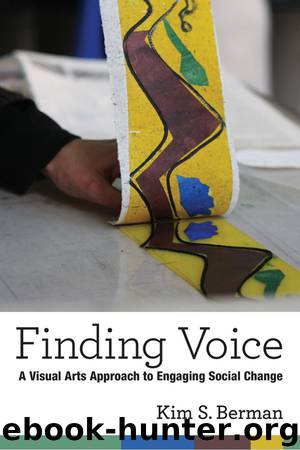Finding Voice by Kim S. Berman

Author:Kim S. Berman
Language: eng
Format: epub
Publisher: University of Michigan Press
Published: 2018-05-15T00:00:00+00:00
Equally disturbing in this model is that access to higher education is based on the ability to pay for tuition, with the result that many people are denied access to higher education institutions.2 South African educator Craig Soudine (2015) argues that this model “furthers the project of white domination” and that “crude power is evident in the admissions practices [of some of the] the emerging universities,” where admission policies “exercise a kind of physical violence on young people of colour.” Crucially, however, there are always individuals who resist these developments and provide “alternative ways of seeing the world” (Hendricks and Vale 2005).
Contemporary South African university culture is rife with contradiction and ambivalence. As the student movement has shown to be urgent, higher education should be a space to engender ideas and practices that enhance cooperation, collegiality, social sharing, and social responsibility. This would allow space for transformative processes that can address the structural characteristics of social inequality. All 26 of the South African universities have been badly affected by running battles and extreme violence, with some students using disruptive tactics to close down their campuses until their demands are met. Increasing security on campus has not been a solution, and the challenge for transformation and access requires more creative responses from university and government actors.3
The challenge of engaging the university as a democratic public sphere, rather than an institution that has aligned itself with market values, also links it to a concern with managerialism. Some contemporary academics have criticized the audit culture of neoliberalism and corporatization in universities, concerned with performance productivity, research outputs, and competitive ratings, rather than with educating students to be critically engaged citizens. For example, Enver Motala calls for a rethinking of the prevailing conventions of scholarship and “the asphyxiating grip on it of peer review” (2015: 23). He argues for more “intellectual activism” and maintains that thoughtful disputation, critical inquiry, and dialogue essential for a democratic, informed, and thinking citizenry seem to be obligatory and unavoidable (2015: 33).
Download
This site does not store any files on its server. We only index and link to content provided by other sites. Please contact the content providers to delete copyright contents if any and email us, we'll remove relevant links or contents immediately.
Draw-A-Saurus by James Silvani(2102)
The Artist's Way Workbook by Cameron Julia(1722)
Breaking the Habit of Being Yourself by Joe Dispenza(1552)
Art & Fear by David Bayles(1421)
Logo Design Love: A guide to creating iconic brand identities (Voices That Matter) by David Airey(1284)
Facial Expressions by Mark Simon(1050)
Secret Teachings of a Comic Book Master by Heidi MacDonald(1049)
How to Master the Art of Selling by Tom Hopkins(997)
Modelling and Sculpture by Albert Toft(994)
Anatomy and Perspective: The Fundamentals of Figure Drawing (Dover Art Instruction) by Charles Oliver(986)
Art Lab for Little Kids (Lab Series) by Susan Schwake(970)
Chinese Brush Painting by Jane Evans(956)
The New Creative Artist by Nita Leland(955)
Your Inner Critic Is a Big Jerk by Danielle Krysa(935)
An Atlas of Animal Anatomy for Artists by W. Ellenberger(916)
Trust the Process by Shaun McNiff(903)
Watercolor Made Simple with Claudia Nice by Claudia Nice(898)
Anatomy by Joseph Sheppard(870)
Paint Pouring by Rick Cheadle(849)
